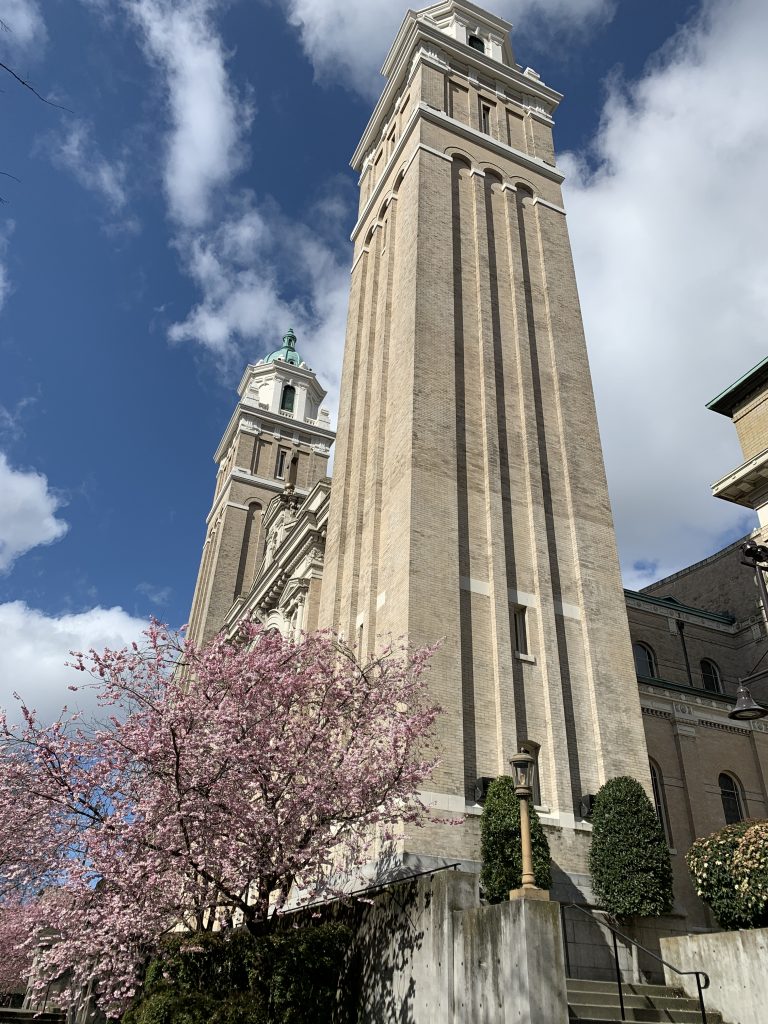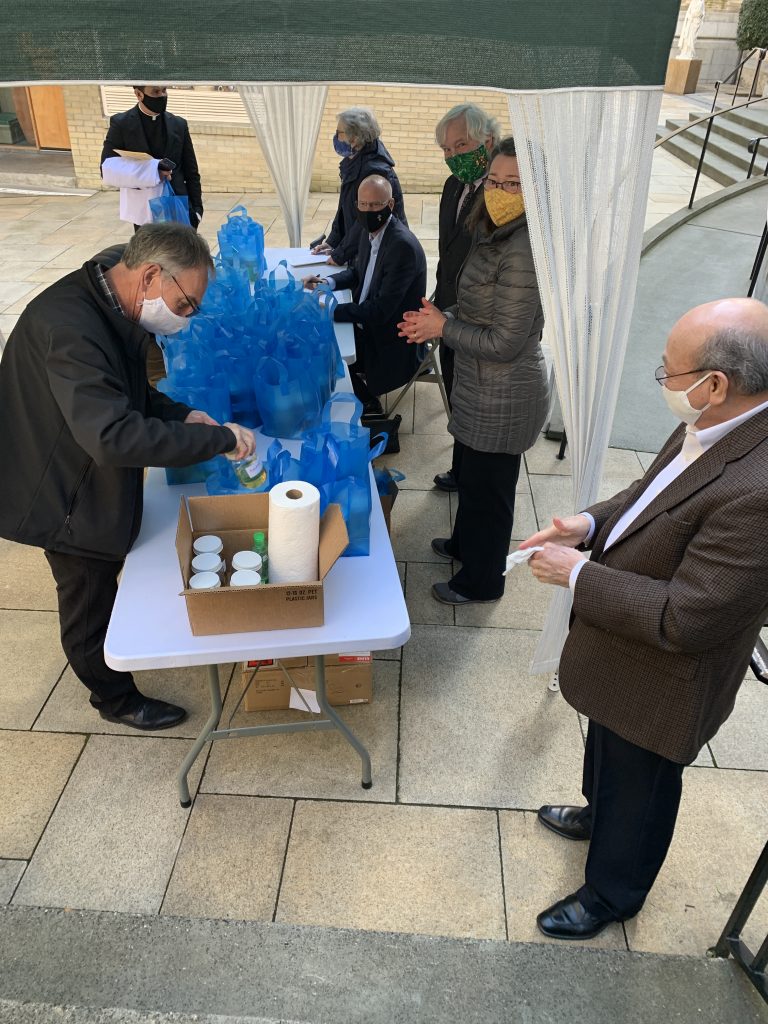Chrism Mass Homily 2021 – St. James Cathedral, Seattle
Our world is suffering. In one short, and yet very long year, nearly 2,800,000 people have died from COVID-19. And the remainder of the human family is suffering on numerous levels, perhaps the most poignant is our isolation from one another.
In addition to this world pandemic, there is tremendous social unrest. There are times when it feels like, and in this past year, it looked like, we are pulling apart at the seams.
People down through the ages cry to the Lord in their need. This cry is heard in the Psalms, in the people of Israel who longed to be freed from bondage in Egypt, and in so many other places for so many reasons.
The Church is not immune, as we hear the cries of suffering from her own members; fear, brokenness, a lack of trust, hurt, pain, exclusion, grief. As pastors, we carry our people in our own hearts and we take their cries to the Lord in prayer.
Lent, as always has been a time to ‘return to the Lord’ and an opportunity to reflect: how much of human suffering is due to our own, self-imposed isolation from God, from our own sinfulness.
Our gathering today is a celebration of the mysterious and marvelous way God has definitively answered the cry and longing of the human family in the person of his own beloved Son, Jesus Christ. “God so loved the world that he gave his only Son, so that everyone who believes in him might not perish but might have eternal life.” (John 3:16)
As a People of Faith – we trust in the Lord, and yet because our humanity is flawed and weak, we waver at times in that trust. We need times and celebrations such as this Chrism Mass to be renewed in faith, hope and love. As Psalm 145 says: “The Lord is near to all who call on him, to all who call on him in truth.” Similarly, St Paul in the Letter to the Philippians encourages us with these words: “Have no anxiety at all, but in everything, by prayer and petition, with thanksgiving, make your requests known to God.” (4:6-7)
In our suffering, it is easy to turn inward, to focus solely on self and what “I am dealing with.” Our suffering foils our deepest desire – even our knowledge, that turning to Jesus is where we find the relief and healing we seek. We heard in the Gospel just proclaimed how Jesus at the beginning of his public ministry claimed this role for himself. As the Son of God, anointed by the Holy Spirit, Jesus IS the glad tidings of God – the Word of God, the Good News of God. Jesus IS our freedom from all that holds us captive. Jesus IS our ability to see the world properly, through the eyes and the heart of God.
Jesus comes not only as the Father’s response to our suffering, but also as a model of how to move out of self towards others in response to their need. Jesus, as God, ‘comes forth from God’ to enter our world and our lives. “Jesus, though he was in the form of God, did not regard equality with God something to be grasped. Rather, he emptied himself, taking the form of a slave, coming in human likeness; … he humbled himself becoming obedient to death on a cross.” (Philippians 2: 6-8)
In our suffering, we can feel justified in making demands of others to rectify ‘my situation.’ The example of Jesus instead calls us to keep moving out of self and moving towards others in their need. The rampant individualism of our time can be rectified with the response of Jesus, which is a proper human response, to become more interested and involved in the needs of my neighbor than fixated on myself. The virus of indifference can only be healed with hearts that are moved with compassion and mercy to recognize the suffering so prevalent in so many of our brothers and sisters and acting accordingly.
The mature disciples must also recognize the role of suffering in the life of faith. Christ’s own suffering is the only thing that helps us makes sense of suffering. Is it not clear that God accomplishes more by our sufferings than our accomplishments? We must learn to suffer well and patiently – not for the sake of suffering itself, but in the manner that it unites to Christ in his greatest moment of manifesting the love of God to the world.
As we bless the oils of the sick and catechumens and consecrate the Chrism Oil today, we recall that Jesus was anointed by the Father in the Holy Spirit. We celebrate how this anointing of Jesus continues through the sacraments of anointing in the Church today. Through Holy Orders, the sacramental priesthood of Jesus Christ remains active in the Church, extending his healing presence to our time.
Here, I wish to express my sincere gratitude to each of our priests for your selfless ministry, in the heart and model of Jesus Christ.
There is one other anointing of Jesus I wish to examine with you today. We recall, as Jesus began his public ministry, he received a baptism by John the Baptist, where the voice of the Father is heard and the Holy Spirit descends upon him. It was shortly after this that Jesus read the passage from Isaiah in the synagogue of his home town of Nazareth, and revealed the nature of his ministry.
Jesus also received an anointing as he was concluding his public ministry. Recall, Mary in the home of Bethany anointed the feet of Jesus, shortly before his crucifixion. Mary recognized Jesus’ suffering – and knew the Jews were seeking to find Jesus to kill him. She recalled Jesus’ teaching that he would suffer, die and rise from the dead. After this anointing, “the house was filled with the fragrance of oil.” (John 12:3)
This anointing seems to speak to the mission of the church today. This anointing is our ‘call to action’ in the face of those who are suffering today. By baptism, each of us share in the life of the Risen Jesus as well as the call to participate in his mission.
Our world is suffering. More specifically, people are suffering. Every person is a child of God, and as such, is my brother and my sister. Every act of compassion and kindness which recognizes a brother or sister’s need is an act of anointing the feet of Jesus. Every time we allow ourselves to break out of ‘my little world’ and overcome the indifference which blinds me to the need of the person next to me we advance God’s kingdom.
Brother priests, dear brothers and sisters, as we enter into these holy days, let us beg God for the humility to enter more fully into the heart of Jesus. Let us repent of our sinfulness and be reconciled to God and one another. Let’s beg ‘Jesus, the faithful witness, the first born of the dead … who loves us and has freed us from our sins by his Blood, who has made us into a Kingdom, priests for his God and Father,’ (Revelation 1:5-6) that we may ‘see’ each person in need and put our compassion and love into concrete action.
On this Feast of the Annunciation, we ask finally for the intercession of Mary, that we may carry Christ within us and serve him in our neighbors, and in a love similar to hers, let us ‘fill the world with the fragrance of oil’.
0
